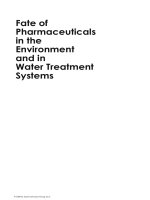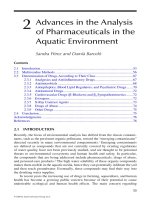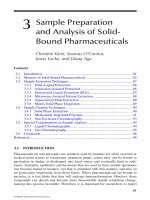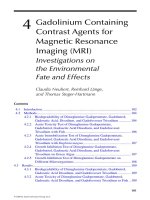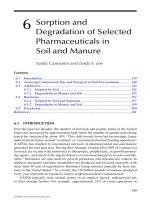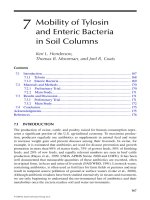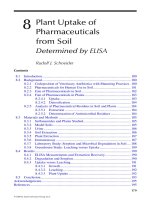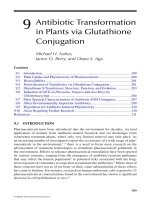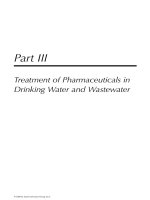Development of inorganic organic hybrid materials for waste water treatment
Bạn đang xem bản rút gọn của tài liệu. Xem và tải ngay bản đầy đủ của tài liệu tại đây (9.49 MB, 263 trang )
DEVELOPMENT OF INORGANIC-ORGANIC HYBRID
MATERIALS FOR WASTE WATER TREATMENT
SUN JIULONG
(B.Sc. QUST)
A THESIS SUBMITTED
FOR THE DEGREE OF DOCTOR OF PHILOSOPHY
DEPARTMENT OF CHEMISTRY
NATIONAL UNIVERSITY OF SINGAPORE
2014
II
III
Declaration
I hereby declare that this thesis is my original work and it has been written by
me in its entirety, under the supervision of A/P Stephan Jaenicke, (in the
laboratory catalysis lab), Chemistry Department, National University of
Singapore, between 10/01/2011 and 10/12/2014.
I have duly acknowledged all the sources of information which have been used
in the thesis.
This thesis has also not been submitted for any degree in any university
previously.
Sun Jiulong
10 DEC 2014
Name
Signature
Date
IV
V
ACKNOWLEDGEMENT
A doctoral thesis like this which involves knowledge from various fields
would not be possible without the help and support from many people. It has
been a truly memorable learning journey in completing the 4 years research
work. Therefore, I would like to take this great opportunity to acknowledge
those who have been helping me along the way.
First and foremost, I would like to express my deepest gratitude to my dear
supervisor, Associate Professor, Dr. Stephan Jaenicke, for giving me the
opportunity to join his team and work together with him. Dr. Stephan Jaenicke
is someone you will instantly love and never forget once you met with him. He
is the most knowledgeable and smartest people I have even met. He always
gives us freedom to pursue various researching project; he always welcomes us
to discuss research results with him, and he always make insightful comments
and suggestions on the projects. So without his immense knowledge,
stimulating suggestions, guidance, encouragement, patience and understanding,
my research results and this thesis wouldn’t have been possible.
I would also like to thank Associate Professor Dr. Chuah Gaik Khuan for her
constant help and invaluable advice throughout my research and the writing of
this thesis. I truly appreciate all the time she has taken to read and correct my
writings and manuscripts.
VI
My sincere thanks also go to Professor Li Fong Yau, Sam, Associate Professor
Wu Jishan, Professor Lee Hian Kee, Madam Toh Soh Lian, Miss Tan Lay San,
Miss Suriawati Bte Sa'Ad, Mr Lee Ka Yau, Dr Chui Sin Yin, Dr Yuan Cheng
Hui, Mr Sha Zhou and Mr Lin Xuanhao for all the help and supporting they
have rendered during my work.
This thesis would not have been possible without the help and support from
my dear fellow lab mates: Dr. Fan Ao, Mr. Do Dong Minh, Dr Liu Huihui, Dr
Toy Xiuyi, Dr. Wang Jie, Miss Han Aijuan, Miss Gao Yanxiu, Mr Goh Sook
Jin, Mr Irwan Iskandar Bin Roslan, Miss Angela Chian, Mr. Zhang Hongwei
and Mr Parvinder Singh.
I am also grateful to QinDie, my grandparents, my parents and parents-in-law,
and my wife for their unconditional love, encouragement, motivation and
understanding. I would like to give my special thanks to my wife, Wang
Xiaoxue, for believing in me and giving me the unconditional trust and
supporting.
Last but not least, I am indebted to the Singapore Peking Oxford Research and
Enterprise (SPORE) and to the National University of Singapore for offering
me this great opportunity to work with my supervisor and my lab mates and as
well as a valuable research scholarship.
